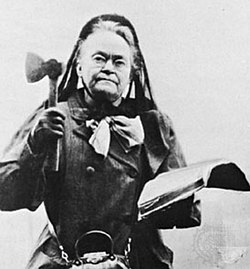
A battle-axe is a derogatory traditional stereotype describing a woman characterized as aggressive, overbearing and forceful. The term originated as a gender-independent descriptor in the early 20th century, but became primarily applied to women around the middle of the century. [1]
Contents
The prime example was the militant temperance activist Carrie Nation, who actually wielded a hatchet and made it her symbol, living in Hatchet Hall and publishing a magazine called The Hatchet. She became involved in the suffragette campaign for votes for women and this campaign further established the archetype. [2] [1] [3]
The battleaxe is one of several stereotypes found in nursing – a tyrannical, fierce matron exemplified by Nurse Ratched or Hattie Jacques in popular medical dramas and comedies. [4] Judith Furse played a "battle-axe woman" in the film Carry On Cabby . [5]
Another example of the battleaxe in popular culture is in soap operas, for which the "quintessential archetype" [6] was Violet Carson, who played Ena Sharples in the world's longest-running television soap opera, [7] Coronation Street .